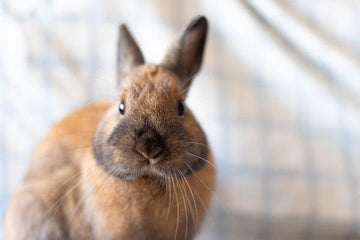Rabbit Is It Low Maintenance or More Work Than You Think?
Rabbits are adorable, quiet, and full of personality. Their gentle nature makes them a popular choice for pet lovers who don’t want the noise or demands of a dog or cat. But there’s a common question that always seems to follow when someone starts thinking about bringing one home—rabbit is it low maintenance?
Click Here For a Beginners Guide to Rabbit Care.

It's an important question, especially if you're new to pet ownership or have a packed schedule. The answer isn’t a simple yes or no. Like most things with pets, the truth sits somewhere in the middle. Let’s break down what owning a rabbit really involves so you can decide if it's the right fit for your lifestyle.
The Appeal of Rabbits as Pets
Rabbits give off the impression of being low-maintenance. They’re small, quiet, and don't need daily walks. For apartment dwellers or people with limited space, that’s a major plus. Plus, you don’t need to buy chew toys every week or chase them through the neighborhood if they get out.
They also groom themselves and don't typically need baths—bonus! With their cute noses and gentle hops, rabbits can feel like the perfect pet for someone who wants calm companionship without too much hassle. But before jumping in, it's worth looking at what life with a rabbit really looks like.
Daily Responsibilities of Rabbit Care
Every pet comes with a list of responsibilities. Rabbits are no exception. If you’re wondering, “rabbit is it low maintenance,” one of the biggest things to consider is the daily care they require.

Feeding and Water
Rabbits need a constant supply of fresh hay—specifically, high-quality timothy hay. It should make up about 80-90% of their diet. On top of that, they need fresh vegetables every day and a measured portion of pellets.
Water needs to be clean and readily available. A water bowl works better than a bottle in most cases, and it needs to be cleaned and refilled daily. Forgetting these basics can lead to serious health issues quickly.
Litter Box Cleaning
Yes, rabbits can be litter trained, which surprises a lot of first-time owners. But don’t expect perfection, and don’t expect it to stay clean on its own. You’ll need to spot-clean the litter box daily and do a full clean at least once a week.
Social Time and Exercise
Here’s where many people get caught off guard. Rabbits are social creatures. They need time outside of their enclosure every day to hop around, stretch their legs, and interact with you. Keeping a rabbit cooped up all the time can lead to depression or aggression.
They also need toys and enrichment to keep them mentally stimulated. This can be as simple as cardboard boxes, toilet paper tubes, or rabbit-safe chews, but you do have to rotate and refresh them often.
Is a Rabbit Easier Than a Dog or Cat?

Some people assume rabbits are easier than dogs or cats. In some ways, that’s true. You don’t need to go on daily walks in the rain or scoop a box multiple times a day like you might with a cat. But rabbits bring their own set of needs.
They require a dedicated space in your home. That might be a large x-pen setup or a free-roam room. Either way, they need room to move. And they’re surprisingly good at getting into trouble—chewing cords, baseboards, or furniture if your space isn’t rabbit-proofed.
So when you ask, “rabbit is it low maintenance,” the answer depends on what you’re comparing it to and what kind of effort you're expecting to put in.
Costs You Might Not Expect
Rabbits don’t cost a lot up front. You can adopt from a rescue or shelter for less than a hundred dollars. But the ongoing expenses can sneak up on you.
-
Veterinary Care: Rabbits need to see an exotics vet, and those can be more expensive and harder to find than general vets.
-
Spay/Neuter Surgery: This is essential to prevent health issues and behavioral problems. It's not optional, and it isn’t cheap.
-
Housing: A quality x-pen or condo-style enclosure costs more than the wire cages pet stores sell. Those small cages don’t meet a rabbit’s space needs.
-
Supplies: You’ll need litter, hay, pellets, vegetables, toys, and bedding on a recurring basis.
Plus, when things go wrong—like a blockage or dental issue—the vet bills can climb quickly. Rabbits hide illness well, so you often don’t know something’s wrong until it’s serious.
Rabbit is it low maintenance – A Closer Look at Temperament

If you’re looking for a chill, independent pet, some rabbits might fit that mold. But likes most pets, each one has their own unique personality. Many are affectionate and curious, and they’ll follow you around the house like a shadow. Others are shy and need time and patience to build trust.
That means spending real time with them every day, especially in the first few weeks after bringing them home. They may not bark or meow, but rabbits communicate through body language. Learning their signals helps build a better bond and prevent behavior issues.
If you have a busy schedule and expect a pet that doesn’t need much attention, a rabbit might not be the right fit. But if you have time to offer and space to share, they can be incredibly rewarding companions.
Common Misconceptions About Rabbit Care
There are a few myths that make people think rabbits are easier than they really are. Let’s clear up some of the big ones:
-
Myth: Rabbits are good starter pets for kids. Reality: Most rabbits don’t like being held, and they’re fragile. Young kids can easily drop or injure them.
-
Myth: Rabbits can live in a small cage. Reality: A healthy rabbit needs space to move, jump, and run.
-
Myth: They don’t need much interaction. Reality: Without regular attention, rabbits can become bored, lonely, and even destructive.
It’s important to research ahead of time and understand the reality of rabbit ownership. Too many rabbits end up in shelters because someone thought they’d be easy pets and found out otherwise.
What Makes Rabbits Unique Companions
Even with all the effort involved, rabbits bring something special. They each have a distinct personality. Some are bold and playful. Others are mellow and sweet. And when you earn their trust, they show affection in their own quiet ways—grooming your hand, resting beside you, or doing a happy binky jump in the air.
If you’re willing to meet their needs, they can be one of the most rewarding pets you’ll ever have. Not everyone wants a pet that chews the baseboards or refuses to cuddle. But for the right person, those quirks become part of the charm.
And unlike dogs or cats, rabbits are mostly silent. No barking, no yowling at 2 a.m. Just soft rustles and the occasional thump when they’re annoyed. That makes them a good match for shared living situations or anyone sensitive to noise.
How to Decide if a Rabbit is Right for You
Before you bring a bunny home, ask yourself some questions:
-
Do I have time each day to interact with my rabbit?
-
Can I afford ongoing care, including vet bills?
-
Is my home safe and spacious enough for a rabbit?
-
Am I okay with chewing damage and scattered hay?
-
Do I have access to an exotics vet nearby?
If you can answer “yes” to all of those, you’re probably in a good place to welcome a rabbit into your home. If not, it might be worth waiting or choosing a pet that better fits your lifestyle.
Final Thoughts
So, rabbit is it low maintenance? Not really. They’re not as demanding as some pets, but they still require time, money, space, and attention. The idea that they’re “easy” often leads to disappointment—for both the human and the rabbit.
But if you’re looking for a calm, gentle companion with personality to spare, a rabbit might be the perfect match. It’s all about understanding what they need and being ready to give it.
If you're ready to meet those needs, you’ll get back more than you expect—quiet loyalty, playful antics, and the joy of building trust with a truly unique animal.

Signs of Rabbit Health: What You Should Know

Decoding Bunny Behavior: Understanding Rabbit Mood










